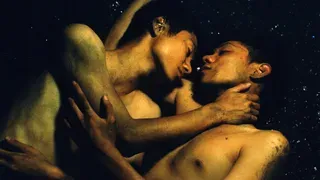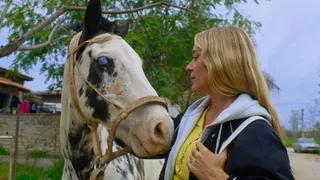February 9, 2023
Review: 'Attachment' is Where Tradition and Possession Collide
Matthew Creith READ TIME: 3 MIN.
"You have to wake up now."
In his feature film directorial debut, "Attachment," Danish filmmaker Gabriel Bier Gislason brings a new horror romance thriller to life. Calling upon themes well-established in movies like "The Exorcist" and "The Babadook," Gislason gives the demonic side of the horror genre some new experiences.
Loosely inspired by stories from the life of lead actor Josephine Park, "Attachment" debuted at several film festivals like Outfest, Fantastic Fest, and the London Film Festival in 2022. Now, the movie finally arrives to the streaming platform Shudder for a new set of audiences ready to learn about tradition and the hold it has over those who believe.
The film opens in a storybook meet-cute moment in a library, where former actress Maja (Josephine Park) bumps into British academic Leah ("Game of Thrones" alum Ellie Kendrick). The two agree to spend time together, getting to know one another, while Leah is newer to the Danish scene. Their romantic entanglement is quickly thrown for a loop when Leah starts displaying odd behavior, like sleepwalking in the middle of the night. The romance is tested after Leah has a seizure, which she claims hasn't happened since she was a child.
While Leah is rehabbing in her childhood home from an injured leg as a result of her seizure, her overbearing mother, Chana (Sofie Gråbøl), inserts herself into the two women's lives. Chana shuts Maja out as much as possible and threatens her continuously. Maja is convinced Chana's hatred of her stems from the fact that she is not Jewish, while Chana and Leah are devout Jews from London.
Strange occurrences ease their way into the house almost daily, with jump scares galore for viewers. What seems like a conservative household steeped in tradition slowly reveals itself as a confined space unwelcome to strangers. To uncover more about Leah's religious upbringing, Maja researches Jewish folklore and is told about the Dybbuk – a tortured soul of someone who has died but now possesses the body of a living person. Could this Dybbuk be trying to harm her, destroy her love for Leah, or could it all be an act prompted by Chana's hatred for outsiders?
With Gislason's unexpectedly dark and sincere screenplay, "Attachment" takes the demonic sub-genre and gives it a new twist. Set in the Hasidic area of North London for much of the film, the premise draws heavily on folklore, art, and literature to create a highly fictionalized vision of the Jewish culture. It is deeply affectionate, thrilling, and horrifying all at once.
The dramatic flair that "Attachment" exudes is largely due to the steadily crafted work performed by Josephine Park as Maja. Unaware of Jewish traditions and the hold it has over the mother/daughter relationship, Maja steps over boundaries laid out by Leah's mother, hoping to save both her sanity and their new bond. As the mousy, chaos-inflicted Leah, Ellie Kendrick is exceptional in a role that asks a lot of an actor. She is unassuming but tortured until the climax, when her character is thrown into a crossroads of religion and matters of the heart.
"Attachment" boasts wild-yet-predictable moments, transitioning from wholesome to diabolical. Every character has faults, and the religious overtones become as overbearing as Leah's mother by the end. Gislason attempts to present a horror film by personalizing it with the early stages of a romantic relationship between two women. However, the result shines a light on the dysfunctional and codependent dynamic between a mother and her daughter.
The payoff is too orderly for a horror movie of its stature, while giving away all of the tension built up for the entirety of the film. "Attachment" seems manipulative initially, but the ending pays tribute to other religious-themed horror movies that have come before. It's commendable in its execution, but forgettable once the credits begin to roll.
"Attachment" will be available to stream exclusively on Shudder starting February 9.







